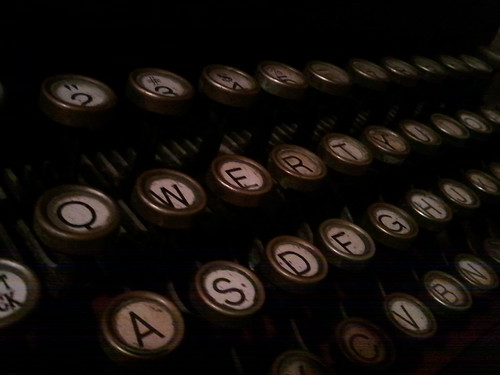I'm currently a mentor for a wonderful Peer to Peer University "class" called Writing for the Web. I have class in quotation marks there as it's described as a "learning challenge" -- a new type of offering from P2PU that focuses more on mentorship and social learning and less on a set curriculum or course of study.
The second challenge involves thinking about how writing for the Web differs from writing that was intended for a print audience. And even though I helped think through the design of these challenges, I admit: this one has had me a little stumped. That's because, thanks to the work I do, I actually read very little that isn't written for the Web.
Reading Then
It's an interesting change in my reading habits, the patterns of which I've long monitored -- with some of the credit going to my fourth grade teacher Mrs. Eudaley, who had the class build a bookworm based on our book reports. A construction paper circle for each segment of its body listed our names, the title and mini-book report. The bookworm grew the more we read. I read 101 books (and wrote 101 book reports) that year, proudly sending the class's bookworm spiraling around the room and out the door.
I've been fixated on monitoring my reading consumption since then.
As such I couldn't help but notice the way in which grad school and a PhD in literature, of all things, destroyed my interest in reading for pleasure. No time. No inclination. Oh sure, I read a lot in grad school, but I read what was assigned by my professors or demanded by my research.
Writing Now
And now? Now I write for a living, and -- how perfect for this P2PU challenge -- I write for the Web. But just as grad school altered my habits -- what I consume, what I produce -- so too does my work now.
This week's challenge: find an article originally intended for a print audience. Summarize/synthesize for a blog post. Think about the following questions: what's different? Length, tone? How is it different visually? How does the reading experience differ?
What struck me as I thought about how I'd complete this challenge is how very little reading I do that isn't online. I mean, I spend my days and nights reading (and of course writing) -- reading blog posts, reading social media status updates, reading newspaper stories online, reading magazine articles online. Now granted, the latter sometimes appear in print publications. But most of what I read is written for the Web.
Form and Content, On and Offline
How does that, in turn, shape the way I write? It's certainly changed the length of what I write -- no more 20 page papers as most posts I write range between 250 and 1500 words. It's changed the frequency -- I write daily and publish quickly. I try to think about "ledes" to engage the reader quickly (a style of opening that's challenging for me to adopt, I admit, since I was long schooled in introductory paragraphs -- a different beast). I think about headlines and sub-headers. I think about how to get people to click on a link to one of my stories, and I think about how to get them to read (or scan more likely) all the way to the end, and I think about doing the things that would motivate people to share it via Twitter, Facebook and the like.
There are plenty of writers and publishers who wring their hands over the move from paper to screen -- okay, well, there's Nicholas Carr for starters. And I do think it's worth thinking about -- as this week's challenge has prompted me to do -- what it means for readers and writers when we make this shift. I'm not talking about a value judgement necessarily. I'll leave that to Carr et al. But I do think that there are issues with both form and content that any writer would want to consider.
For me, I want to pause and think about my craft as a writer. I do value long-form. I do value contemplation. I do value well-crafted prose. Some days, it doesn't feel like there's a lot of that on the Web. That's not to say there couldn't be. That's not to say that I can't be someone who writes thoughtfully and well and at length online. So, now I have to figure out if my reading habits -- again, mostly devoted to the Web nowadays -- are going to help me do that. Or if I need to carve out more time to read print.
Photo credits: Mike McKay
